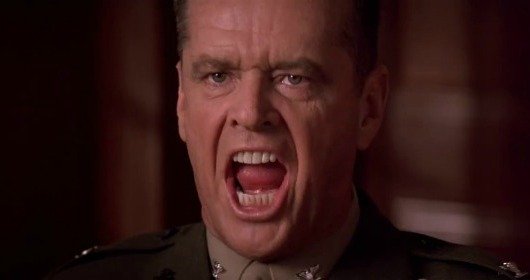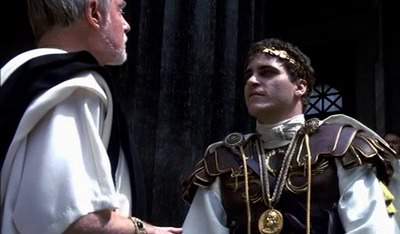And it has the power to get your screenplay tossed, instead of read.
How do you write an effective dialogue, a dialogue that REALLY contributes to your story?
Simple.
Make sure it fulfills these 5 dialogue functions.

We asked the Colonel Jessep from the screenplay "A Few Good Men", written by Aaron Sorkin, to lead us through the 5 movie dialogue functions.
Why? because he's an extraordinary character who uses one or more of these functions every time he speaks.
And he has no issue letting us know the "truth" about what they are and how to use them.
Whatascript!:
Colonel, you covered so far for us the basics of dialogue and three of the 5 movie dialogue functions:
Can you tell us your views on the fourth of these 5 movie dialogue functions: conflict?
Col. Jessep:
With pleasure.
"Conflict is what every story is really about."
It's about someone who wants something and someone else gets in his way of getting it.
And the bigger the want and the opposition are, the bigger the conflict is.
Nobody would have come to see me in "A Few Good Men", if I had agreed with everybody on everything.
But we ALL disagreed. BAM! Conflict. One, two, three, plenty of conflicts.
And the movie dialogue - in the said or unsaid (subtext) - allows to express that conflict and build tension in the story.
Whatascript!:
Colonel, can you give us some examples to illustrate this movie dialogue function?
Col. Jessep:
I'll give you three, son.
Example #1:
the commander Galloway comes to Guantanamo to see mee and asks me about the Code Red.
JO Colonel, the practice of code Reds is still condoned by officers on this base, isn't it? JESSEP You see my problem is, of course, that I'm a Colonel. I'll just have to keep taking cold showers 'til they elect some gal President. JO I need an answer to my question, sir. JESSEP Take caution in your tone, Commander. I'm a fair guy, but this fuckin' heat's making me absolutely crazy. You want to know about code reds? On the record I tell you that I discourage the practice in accordance with the NIS directive. Off the record I tell you that it's an invaluable part of close infantry training, and if it happens to go on without my knowledge, so be it. I run my base how I run my base. You want to investigate me, roll the dice and take your chances. I eat breakfast 80 yards away from 4000 Cubans who are trained to kill me. So don't for one second think you're gonna come down here, flash a badge, and make me nervous.
Example #2:
It follows above scene. Lt Kaffee who's there with commander Galloway asks me about the transfer order of Private Santiago.
KAFFEE Let's go. Colonel, I'll just need a copy of Santiago's transfer order. JESSEP What's that? KAFFEE Santiago's transfer order. You guys have paper work on that kind of thing, I just need it for the file. JESSEP For the file. KAFFEE Yeah. JESSEP (pause) Of course you can have a copy of the transfer order. For the file. I'm here to help anyway I can. KAFFEE Thank you. JESSEP You believe that, don't you? Danny? That I'm here to help anyway I can? KAFFEE Of course. JESSEP The corporal'll run you by Ordinance on your way out to the airstrip. You can have all the transfer orders you want. KAFFEE (to JO and SAM) Let's go. The LAWYERS start to leave. JESSEP But you have to ask me nicely. KAFFEE stops. Turns around. Sam and JO stop and turn. KAFFEE I beg your pardon? JESSEP You have to ask me nicely. You see, Danny, I can deal with the bullets and the bombs and the blood. I can deal with the heat and the stress and the fear. I don't want money and I don't want medals. What I want is for you to stand there in that faggoty white uniform, and with your Harvard mouth, extend me some fuckin' courtesy. You gotta ask me nicely. KAFFEE and JESSEP are frozen. Everyone'staring at Kaffee; The OFFICERS at their tables... KENDRICK... SAM... MARKINSON... JO... KAFFEE makes his decision. KAFFEE Colonel Jessep... if it's not too much trouble, I'd like a copy of the transfer order. Sir. JESSEP smiles. JESSEP No problem.
Example #3:
It regards a colleague of mine, the Emperor Commodus. He passed away in very tragic circumstances. He was in a script written by David Franzoni and John Logan, Gladiator. In this scene he talks to Gracchus, a representative of the Senate.

COMMODUS ... I shall hold them to my bosom and embrace them tightly -- GRACCHUS Have you ever embraced someone dying of plague, sire? Commodus stops. Looks at him. A lethal moment. COMMODUS No. But if you interrupt me one more time I assure you that you shall.
A family member of mine, Aaron Sorkin , said in an interview:
Any time you get two people in a room who disagree about anything, the time of day, there is a scene to be written. That's what I look for.
Conflict is at the heart of the story. Always.
Conflict is also the best way to:


You may not realize it but by taking this simple action you
empower us to write more articles like that - one Comment/Like/Share at a time.
Thanks for that.
Find out about the last dialogue function #5: Calling forth emotions and the end of our interview
Pictures and screenplay extracts:
"A Few Good Men" - Jack Nicholson (Colonel Jessep), Tom Cruise (Lt Kaffee); Aaron Sorkin (screenplay), Rob Reiner (director), Robert Richardson (director of photography), Columbia Pictures and Castle Rock Entertainment
Go from 5 movie dialogue functions (part 4) to Home page
* Avatar, screenplay written by James Cameron